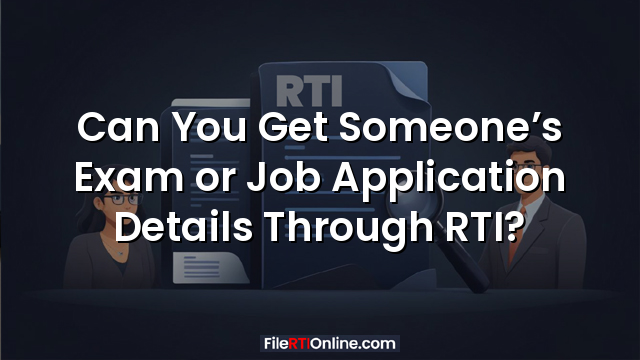Can You Get Someone’s Exam or Job Application Details Through RTI? What the CIC Says About Personal Information
Many people file RTIs seeking application forms, personal details, or background information submitted appearing for government exams or job recruitment. These requests usually relate to disputes, suspicion of suppression of facts, matrimonial issues, or verification of a candidate’s past.
A key question arises:
Can you get the information someone has filled in their exam or job application form through RTI?
A major CIC judgment clarified that such information is personal, protected , and cannot be released unless there is a larger public interest.
Below is the simplified explanation of the case and the legal principles.
Background: RTI Filed to Obtain Wife’s Exam Application Details
An applicant asked the Kerala High Court (through RTI) to disclose:
· The details his wife had filled in her application form for an examination.
He claimed:
· The “purity” of candidates appearing in the exam is important.
· He suspected his wife had suppressed criminal and civil cases pending against her.
The Public Information Officer (PIO) refused to share the details, citing that it was personal information.
The matter went before the Central Information Commission (CIC).
CIC’s Key Observations: Why Such Information Cannot Be Disclosed
The CIC rejected the appeal and held:
1. Information filled in an examination or recruitment application is personal.
· These details include personal history, identification details, declarations, etc.
· They are meant only for the authority conducting the exam, not the public.
2. Personal information cannot be disclosed unless larger public interest exists.
Section 8(1)(j) of the RTI Act protects:
Information which relates to personal matters and has no relation to public interest.
In this case:
· The dispute was between the applicant and his wife.
· The request was not for a public purpose, but for personal reasons.
So the exemption applied.
3. Information becomes public only after selection and appointment.
CIC clarified:
· If the candidate gets selected and appointed to a public post, the details relevant to eligibility may then become public because they form the basis of public employment.
· Before that stage, the information remains private.
4. Examination-related personal records cannot be accessed or relatives.
RTI cannot be used for:
· Matrimonial disputes
· Personal conflict
· Verification of spouse’s past
· Fishing inquiries
Only the individual concerned can seek such information about themselves.
So Can You Get Someone’s Exam or Job Application Details Through RTI?
No — not unless you prove a strong public interest.
RTI will NOT give you:
· Personal details filled in exam/job forms
· Declarations made candidate
· Criminal/civil background details of another person
· Identity details, documents, or certificates submitted
· Anything related to a private marital dispute
RTI MAY give information if:
· The candidate is selected for a public post and
· The details directly relate to eligibility, fraud, fake certificates, or public interest
However, this also requires strong justification.
When Does “Larger Public Interest” Apply?
Examples where disclosure might be allowed:
· Candidate used fake certificates to get a government job
· Major fraud affecting public money
· Criminal background concealed for a sensitive government post
· Public safety or integrity is at risk
But even in these cases, the applicant must provide clear, strong evidence.
Conclusion
RTI is not meant to be used for personal disputes, especially matrimonial issues.
The CIC has made it clear:
Personal details furnished in exam or job application forms cannot be disclosed, unless a larger public interest is clearly proven.
This protects privacy, prevents misuse, and keeps RTI aligned with its true purpose.


